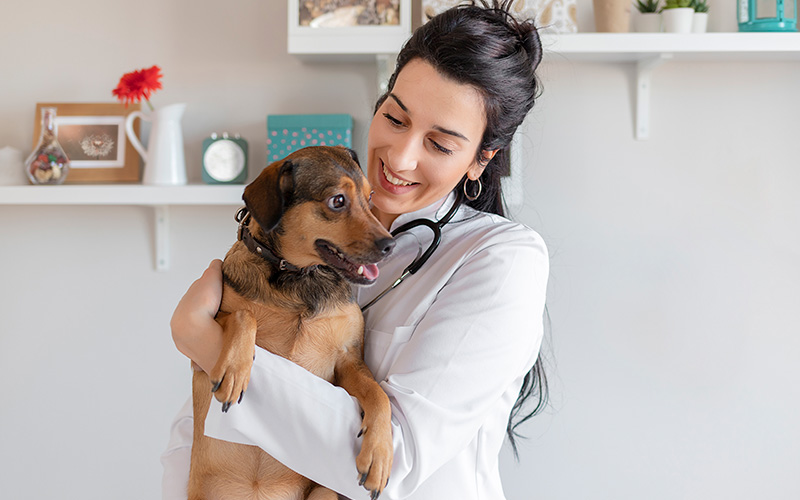World Veterinary Day 2021 (April 24th, 2021) celebrates the role of veterinary medicine in response to the COVID-19 crisis and the contributions of veterinary teams everywhere in protecting the health of animals, people, and the environment.
In announcing this year’s theme—“Veterinarian response to the COVID-19 crisis”—the World Veterinary Association (WVA) writes, “The continuing COVID-19 crisis, caused by the severe acute respiratory syndrome coronavirus 2 (SARS-CoV-2), changed life as we know it.”
“Change” is an understatement.
Like doctors, nurses, technicians, practice managers, and other people working in human medicine, veterinary teams in small-animal practices and emergency animal hospitals were already working long hours under often-stressful conditions prior to the pandemic. When COVID-19 hit, the whole situation became much more difficult for veterinarians and their teams to manage.
- Against a tidal wave of pet appointments caused by the pandemic pet boom, veterinary teams had to quickly pivot and adopt technology and best practices for curbside veterinary service.
- Social distancing orders and public safety protocols forced veterinary practices to adopt telemedicine on a previously unseen scale.
- Veterinary teams had to field questions and calm pet owner fears amidst false and misleading information across social and mainstream media about pets and COVID-19.
- While tangling with the challenges of new operational protocols (frequently made more difficult by ramped-up cleaning and sanitation procedures, and staff and PPE shortages), many practices took a substantial financial hit through 2020.
- Self-care took on new importance to combat COVID-19 burnout.
Capturing the overall impact on veterinary teams, author and DVM Jessica Vogelsang called it an “emotional hellscape” in her May 26th, 2020 blog, and one veterinarian said to the New Zealand news website Newsroom that the ongoing situation was like “Friday the 13th every day.”
Against it all, writes the WVA, “Veterinary medicine meaningfully and rapidly evolved, demonstrating veterinarian’s ability to cope, adjust, and adapt; and to continue their role as leaders of animal health and welfare and public health.”
Echoing the WVA’s connection between veterinary medicine and public health, Frontiers in Veterinary Science wrote in October 2020, “The emergence and spread of zoonotic diseases like COVID-19 caused by SARS-CoV-2 indicates that veterinarians inhabit a central and primary position in the prevention of new and dangerous zoonoses that may impact health. This is particularly true as this pandemic fits into the One Health Concept, which considers the interactions between humans, animals, and the environment.”
Created in 2000 by the WVA to honor the veterinary profession and their lifesaving work, World Veterinary Day has steadily embraced the concept of One Health:
- In 2018, the theme of World Veterinary Day centered on the crucial role that veterinarians play in more sustainable animal husbandry practices, which (according to the WVA) “improve not only the health of animals, but also the health and well-being of people and the environment.”
- In 2019, the WVA partnered with the global animal medicines association HealthforAnimals to promote the Value of Vaccines as an essential tool for both veterinary medicine and reducing the risk of human exposure to zoonotic pathogens.
- In 2020, the WVA again partnered with HealthforAnimals to celebrate veterinary professionals and more formally acknowledge their roles as practitioners of One Health.
While the AVMA notes on its website that studies in the areas of human, animal, and environmental science “are largely conducted independently, and obvious connections may be missed,” the AVMA also notes that as the human population continues to grow and relationships with animals continue to evolve, “understanding the interdependencies of people, animals, and the environment becomes even more critical to our collective health and safety.”
American scientist Neil deGrasse Tyson expressed the same message of interdependency when he said, “We are all connected; To each other, biologically. To the earth, chemically. To the rest of the universe, atomically.” While Tyson’s words encompass a cosmological scale, he was nonetheless talking about One Health, brought into focus by COVID-19, which has made more people aware that the hard work and dedication of veterinary teams everywhere has meaning and effect beyond the exam room.
In other words, veterinary team members everywhere can celebrate themselves this World Veterinary Day, not just for rising in heroic response to COVID-19 but for being an integral part of bringing a better tomorrow into reality.






